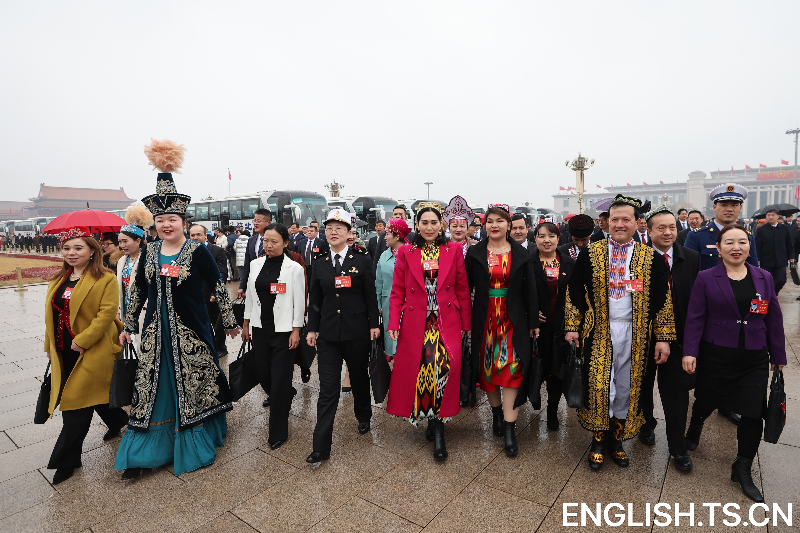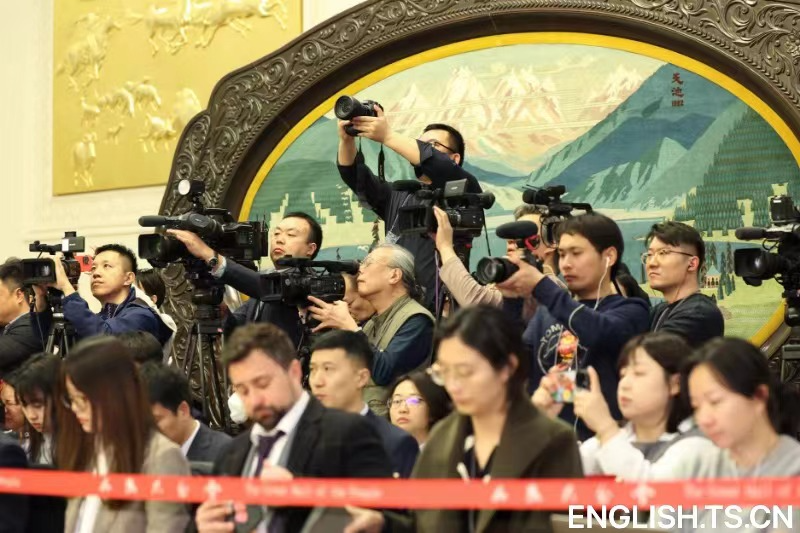Following the Chinese New Year, China convened the annual sessions of the National People's Congress (NPC) and the Chinese People's Political Consultative Conference (CPPCC) in Beijing.
Deputies and members participated in the seven-day sessions in Beijing, engaging in the legislative process and the decision-making mechanism regarding the country's governance. According to China’s Constitution, the NPC, with nearly 3,000 deputies, is the highest organ of state power. During the annual NPC sessions, new laws will be passed, decisions will be made on changes in leading government officials, and the government budget will be approved.

On March 5, 2024, the second session of the 14th National People's Congress (NPC) opened at the Great Hall of the People in Beijing. The photo shows NPC deputies from Xinjiang entering the venue for the meeting. (Photo by Shiliuyun-Xinjiang Daily/Cui Zhijian)
The CPPCC brings together over 2,000 political advisors from various sectors of society. It is often seen as part of the “United Front” efforts, which do not necessarily require its members to be affiliated with or belong to the Communist Party of China. The CPPCC also has members from China's other eight political parties.
This year's “two sessions” are expected to outline the main directions for China's socio-economic development, with a focus on areas closely related to Xinjiang, high-quality opening-up, and ensuring the standard of living for people. Xinjiang, with its strategic location, abundant natural resources, and cultural diversity, holds significant importance in both China's domestic and foreign policies.

On March 7, 2024, the Xinjiang delegation to the second session of the 14th National People's Congress held an open event at the Xinjiang Hall of the Great Hall of the People in Beijing, capital of China. The photo shows domestic and international journalists attending the event.(Photo by Shiliuyun-Xinjiang Daily/Cui Zhijian)
High-Quality Opening-up
Xinjiang's strategic location plays a key role in China's efforts to expand trade with Central Asia and Europe. High-quality opening-up could strengthen the trade routes and infrastructure projects passing through Xinjiang, making it a significant center for global trade. These efforts could promote regional economic integration and enhance Xinjiang’s position at the core of China's Belt and Road Initiative.
Annual Growth Target and Xinjiang
China's annual growth target will directly affect Xinjiang's economic development. A high growth target can stimulate increased investment in the region, accelerating development, especially in key sectors such as agriculture, energy, and tourism. Xinjiang's agricultural potential, particularly in cotton production, and its development of renewable energy sources will offer significant opportunities.
Reforms Focused on Key Areas
Reform implemented in Xinjiang supports the region's long-term development. Improvements in access to education and healthcare services will enhance the quality of life for the people, while legal and administrative reform could improve the business environment and increase investor confidence. Additionally, policies that maintain ethnic harmony and cultural diversity could strengthen social stability and support the inclusive development of the region.
New Quality Productive Forces
Xinjiang is becoming an energy hub with investments in renewable energy sources. Investments in clean energy sources, such as solar and wind power, could not only boost the region's productivity but also play a crucial role in achieving China's carbon peaking and neutrality goals. This could revitalize the local economy and establish Xinjiang as an important player in international energy markets.
Ensuring the Standard of Living for the People
Decisions made during the “two sessions” will aim to improve the living standards of the people. Enhancing health, education, housing, and employment opportunities can promote balanced social and economic development in the region. Additionally, policies that increase public participation and representation can promote transparency and accountability in governance, thereby earning public trust.
The decisions and policies made during the “two sessions” are expected to significantly contribute to the social and economic development of China. These policies, which aim to maximize China's potential, could help achieve China's development goals at both local and national levels. High growth targets, strategic reforms, innovative productivity enhancement methods, improvements in the quality of life, and effective opening-up are fundamental elements that will ensure Xinjiang's significant position both domestically and internationally. Thus, the “two sessions” are anticipated to provide significant contributions to Xinjiang's development and its role in China's overall growth.
Serdar Yurtcicek is from Türkiye and a postdoctoral researcher at Shanghai University.
Producer: Xiao Chunfei
Supervisors: Ding Tao and Jie Wenjin
Planners: Jie Wenjin and Cheng Li
Reviewers: Cheng Li and Hou Weili
Editor: Gvlzar Mijit









